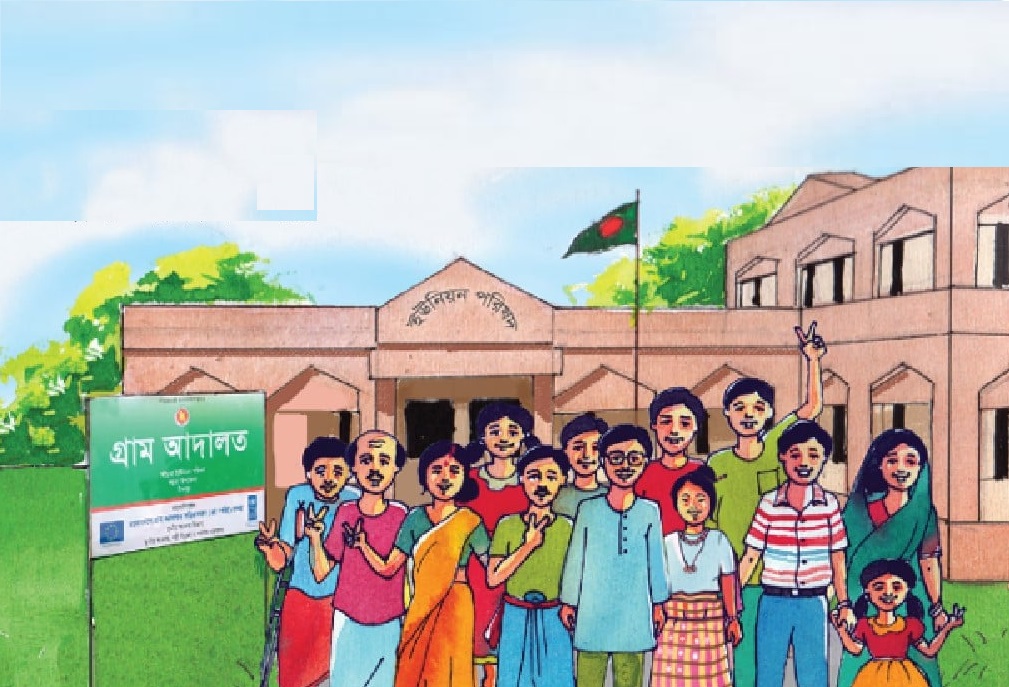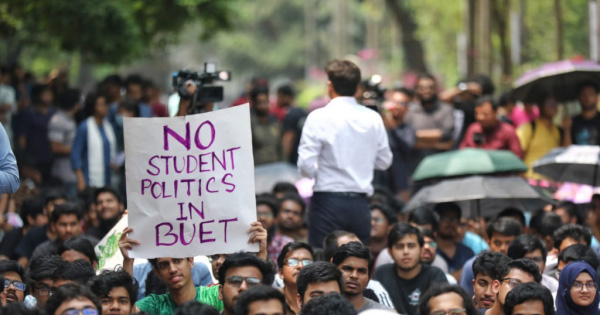In the bustling streets of Dhaka, amidst the ordinary chaos of daily life, an eight-year-old girl named Mithila Akter is left grappling with a question no child should ever have to ask: “Why is my father not talking to me anymore?” The heart-wrenching image of this young girl peering through the window bars at her father’s lifeless body, kept in the mortuary of Dhaka Medical College Hospital, is a stark reminder of the human cost of political violence in Bangladesh.
Mithila’s father, Mokbul Hossain, was killed in a clash between police and BNP supporters in the Nayapaltan area. What began as a day like any other, with Mokbul calling his daughter in the morning to check if she had her breakfast, ended in unimaginable tragedy. Now, Mithila, a second-grader, is left with only memories and unanswered questions.
This incident is not an isolated one; it is part of a disturbing pattern where members of the opposition, particularly those associated with the Bangladesh Nationalist Party (BNP), are increasingly becoming targets of state-sponsored violence. The ruling party, Awami League, has been accused of using excessive force and unlawful means to suppress dissent, silence opposition, and maintain a stranglehold on power.
A Family’s Grief and a Nation’s Shame
Mokbul Hossain, a humble artisan who made a living through Karchupi – the intricate craft of beaded and metal embroidery work – was not just a political activist. He was a husband, a father, and the sole breadwinner for his family living in Mirpur’s Bauniabadh area. His wife, Halima Begum, now faces the harsh reality of raising their children alone, with no means of support. “Why did they kill my husband?” she cries out in anguish, her grief compounded by the knowledge that her children’s future is now uncertain.
The circumstances surrounding Mokbul’s death are murky. While his family claims they were unaware of his political affiliations, they revealed, once the police had left, that he was a BNP activist. Mokbul’s involvement with the BNP, a party increasingly under siege by the Awami League’s crackdown on opposition, may have sealed his fate.
The Awami League’s War on Dissent
The tragic death of Mokbul Hossain is a chilling example of how far the ruling Awami League is willing to go to quash any opposition. The ongoing repression of BNP members and supporters is not just an attack on a political party; it is an assault on the very principles of democracy and freedom of speech. The Awami League’s strategy appears to be rooted in a belief that by eliminating opposition voices, they can maintain uncontested power. But this comes at a grave cost – the erosion of democratic norms and the infliction of deep, lasting wounds on the social fabric of Bangladesh.
This ruthless suppression has led to the deaths, arrests, and harassment of countless opposition members, activists, and ordinary citizens. The regime’s tactics include arbitrary detentions, police brutality, enforced disappearances, and even extrajudicial killings, all designed to instill fear and silence dissent.
For families like Mokbul’s, the political games played by those in power are devastating. Halima Begum, now widowed, must navigate an uncertain future without her husband. Nasrin Begum, Halima’s elder sister, recounts how Mokbul had borrowed money that very morning to purchase materials for his work, unaware that it would be his last day alive. His death leaves not just a financial void but an emotional one that his young children, especially Mithila, will carry with them for the rest of their lives.
As the bloodshed continues, the cries for justice grow louder. The killing of Mokbul Hossain is a tragic reminder of the price paid by ordinary citizens caught in the crossfire of political conflict. It is a testament to the fact that in Bangladesh today, simply having an opposing view can cost you your life.
Mithila’s innocent question, “Why is my father not talking to me anymore?” should haunt the conscience of those in power. It is a question that demands answers, not just for her but for all the families who have lost loved ones to political violence.
The international community and human rights organizations must stand up and take notice of the atrocities being committed under the guise of maintaining law and order. The people of Bangladesh deserve better than to live in fear of their government. They deserve justice, accountability, and most importantly, the right to speak freely without the threat of violence.
As we mourn the loss of Mokbul Hossain and others like him, we must also demand an end to this cycle of violence. The ruling party must be held accountable for its actions, and the voices of the opposition must be allowed to speak without fear of retribution. Only then can Bangladesh hope to heal from the wounds of its past and move towards a future where every citizen, regardless of their political beliefs, can live in peace and security.







